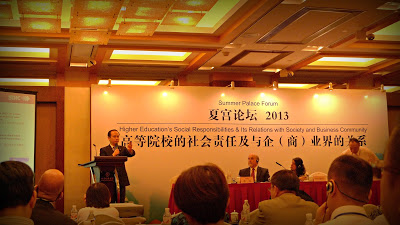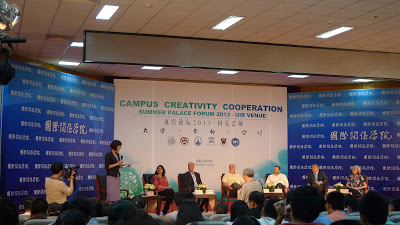The Rockefeller Center is led by talented staff and faculty, whose expertise is often called upon to speak at events large and small. The Center's Deputy Director, Sadhana Hall, was a featured speaker at a new conference in China during the summer of 2013. Read on for takeaways and highlights.
On June 29-30, 2013, the University of International Relations’ Center for International Strategy and Security Studies and Marietta College’s China Institute and McDonough Leadership Center co-sponsored the First Annual Summer Palace Forum in Beijing, China. Forum speakers and participants discussed the relationship between higher education, the promotion of social responsibility, and the preparation of students for the workplace. Forum organizers included speakers from Marietta College, Harvard Business School, Princeton University, the Nelson A. Rockefeller Center at Dartmouth College and leaders of major Chinese enterprises.
 |
| Day One of the Forum: Presentations on Social Responsibility and Higher Education |
The first day highlighted the relationship between higher education and social responsibility. Over one hundred educators, public officials, and corporate leaders, from China and abroad, discussed higher education promotes and can inculcate a sense of social responsibility, and the important role these educational institutions play in nurturing leaders and servants for a rapidly changing society. Chinese presenters explained their views of the need for and approaches to preparing graduates for the workplace whereas the American presenters focused on preparing their students to be socially responsible and developing commitment to “make a difference”. Finally, Chinese educational institutions present were particularly interested in going beyond a model that not only develops technical competence but also develops critical thinking, innovation, and creativity using a Liberal Arts education model.
The second day focused on campus life, creativity, and cooperation in higher education, during which speakers from the American Universities addressed nearly two hundred students from the University of International Relations. During this highly interactive session, speakers’ encouraged students to find their passion and establish a vision, undertake things that are beyond their comfort zone, take risks, think about being entrepreneurial, be courageous followers, and learn how to negotiate.
The First Annual Summer Palace Forum provided a platform for collaboration between American and Chinese leaders in crafting, discussing, and shaping the relationship between higher education and social responsibility. Moving forward, the Summer Palace Forum will be held each summer in Beijing.
 |
| Day Two of the Forum: Speakers participate in a Moderated Q&A Session |
Brief descriptions of the speakers’ presentations, organized alphabetically by the speakers’ last names, follow:
Dr. Joseph Bruno, President of Marietta College, helped the attendees understand the history of the evolution of liberal arts institution. He then described Marietta College’s goals, its financial structure, and organization. Dr. Bruno reflects on the inaugural Summer Palace Conference in Beijing, China, in this video.
Dr. Cynthia Cherrey,Vice President for Campus Life and a lecturer in the Woodrow Wilson School of Public and International Affairs at Princeton University, set the framework for discussion in her opening keynote for the forum. She explained the need to have strong and capable leaders and leadership in order to solve the complex problem our interdependent world faces today. Dr. Cherrey provided examples of emerging leadership programs in business, public, and academic organizations designed to meet the global demand for effective, principled leaders. Dr. Cherrey then described the International Leadership Association (ILA) as a growing global network of scholars, educators, and practitioners that convenes conferences and meetings around the world to enhance the study, teaching, and practice of leadership.
Ms. Sadhana Hall, Deputy Director of the Nelson A. Rockefeller Center for Public Policy and the Social Sciences at Dartmouth College, outlined the Rockefeller Center’s role in training, educating, and inspiring its students for responsible citizen leadership in all fields and endeavors. The Rockefeller Center incorporates civic engagement and social responsibility into its curricular and co-curricular programs. The Center’s programs facilitate self-reflection and situational awareness, and encourage students to clarify their values and convictions and lead accordingly. Students discuss their relationship to and experiences with values such as integrity, ethics, authenticity, and accountability as they commit to causes larger than them.
Dr. Gama Perruci, Dean of the McDonough Leadership Center at Marietta College, introduced the McDonough Leadership Center’s mission and approach to leadership development. Dr. Perruci defined leadership as a complex human phenomenon with different, interconnected components; leadership describes the collaboration between both leaders and followers in achieving goals within an environmental context shaped by cultural values and norms. The McDonough Leadership Center integrates knowledge, action, and growth, three aspects of the path to leadership development. Dr. Perruci concluded his presentation by emphasizing the Center’s efforts in helping students to “give back” to society.
Mr. Wang Tengjiao, Deputy Director of the Department of Computer Science and Technology and Secretary General of the Database and Application Software Industry Association, presented on the role of universities in technological advancement across industries. Mr. Wang discussed the potential room for cooperation between Chinese enterprises and Chinese universities in terms of research and development. Mr. Wang urged Chinese universities, students, and professors to study the new trends and emerging demands in relevant industries, calling for an overhaul of Chinese universities’ management systems of industry-related research. Mr. Wang also discussed the need for the Chinese government to coordinate between universities and corporations, encouraging market-oriented scientific and technological research.
Mr. Yang Yuanming, President of the Beijing Zhong Ke Heng Ji Science Research Institute, discussed the social responsibility of higher education to foster innovative talents for society. Mr. Yang noted that the Chinese educational system has achieved quantity, producing higher numbers of college graduates, but he urged higher education to focus on quality. Mr. Yang observed that Chinese universities must have high degrees of autonomy and independence from the government in order to succeed. Furthermore, Mr. Yang critiqued the commercialization of the Chinese educational system; many college administrators run their universities like for-profit companies, he noted. Mr. Yang emphasized that colleges need enough freedom to think and act independently, property rights should be clearly defined and protected, and universities should encourage the entrepreneurial spirit.
Dr. Andy Zelleke, Senior Lecturer of Business Administration at Harvard Business School discussed the role of his institution in educating future leaders. In 2011, Harvard Business School launched Field Immersion Experiences for Leadership Development (FIELD), an experiential course in leadership development required for all first-year MBA students with the purpose of enhancing ‘global intelligence’ of students. Using design thinking, FIELD students develop new product and service ideas for emerging market companies. Beginning with ideation and ending with sales, students launch their own microbusinesses by the end of the course. The structure of the course allows students to learn many things: specifically, things get accomplished through group work better, leadership is about individuals creating conditions for others to thrive in, and it is important to be aware and understand cultures different from your own.
Dr. Zhang Xiaolan, Deputy Director of the Center for International Strategy and Security at the University of International Relations (UIR), explained how universities could serve society. Dr. Zhang described the shifting position of universities; as universities emphasize social services, they further integrate themselves into society. Dr. Zhang described how UIR, a national university directly administered by the Department of Education in China, places the national interest of China as the responsibility of the school and its students. UIR strives to maintain a low faculty to student ratio, focuses on the study of the humanities, and employs a strong mentoring system. Dr. Zhang observed how UIR has adapted in response to changes in societal trends; the school has established the Center for International Strategy and Security Studies, published national security-related academic journals and books, established the Institute of Public Market and Government Procurement, and offered courses to government officials across the country.

